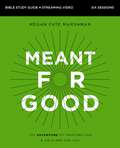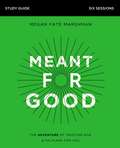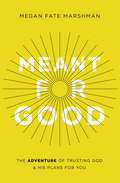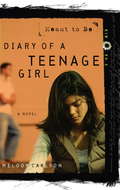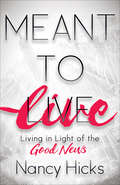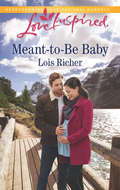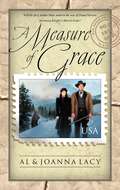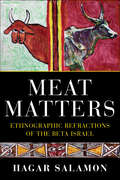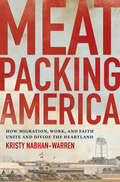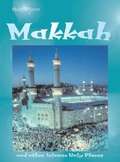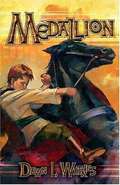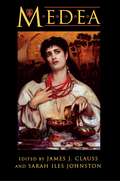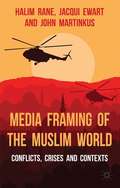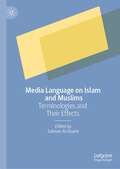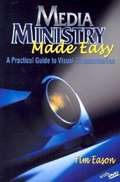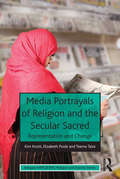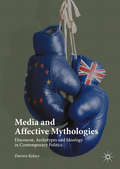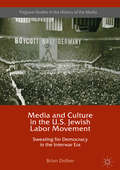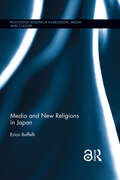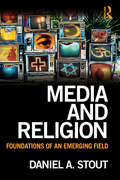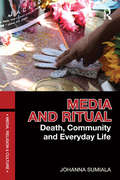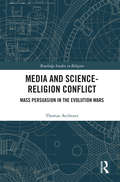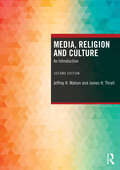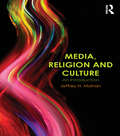- Table View
- List View
Meant for Good Bible Study Guide plus Streaming Video, Updated Edition: The Adventure of Trusting God and His Plans for You
by Megan Fate MarshmanDo you really think your plans could be better than God's?Meant for Good is a power-packed, video-based Bible study that looks at the truth that you can trust God's plans for your life—no matter what it looks like right now. Dynamic Bible teacher Megan Fate Marshman will help you and your group discover how to step into the hopeful future God has for you.Redefine your perspective on who and what matter most in your life. With authenticity and revealing insights into the character of God, Megan unpacks Jeremiah 29:11–14 and what exactly is meant by "good" from God's perspective. This Bible study will teach you that trusting God with everything—yes, EVERYTHING—is a life of adventure you simply couldn't plan for yourself.This study guide includes:Individual access to six streaming video teachings from MeganEngaging and evocative group discussion questions and activitiesIn-depth personal Bible study sessionsA section to track your experience as you grow in new spiritual practicesA series of spiritual formation practices for you to carry on well beyond the studyStreaming video access included. Access code subject to expiration after 12/31/2029. Code may be redeemed only by the recipient of this package. Code may not be transferred or sold separately from this package. Internet connection required. Void where prohibited, taxed, or restricted by law. Additional offer details inside.
Meant for Good Bible Study Guide: The Adventure of Trusting God and His Plans for You
by Megan Fate MarshmanThe most-underlined verse in the Bible, Jeremiah 29:11, says that God has a good plan for you—a plan to give you a hope and a future. Are you ready to believe it? Do you think you can really trust God's plan for your life—no matter what your life looks like right now?In this six-session video Bible study (DVD/video streaming not included), dynamic Bible teacher Megan Fate Marshman will take you through an engaging exploration of the significance of Jeremiah 29:11-14. Through interactive Bible study exercises, you will discover how to stop discounting yourself from a hopeful future, start living in active dependence on God, and find your way to the good plan He has for you.In this beloved passage of Scripture, Megan reveals how to trust God in your daily life and, more importantly, how to trust God's definition of good above your own.You will discover: Your not-enoughness is exactly enough for God, and that in fact, you have everything you need to take that first step into the life God has for you.How to stop counting yourself out because Jesus never has. God is up to something really good, and He's inviting you to join Him.How to hear and respond to God's voice, and intentionally grow a personal, intimate relationship with Him.How to defeat anxiety, trust God with all you're carrying and worrying about, and experience a life of freedom in relying on God daily.Designed for use with the Meant for Good Video Study available on DVD or streaming video, sold separately.
Meant for Good: The Adventure of Trusting God and His Plans for You
by Megan Fate MarshmanMeant for Good is a power-packed, biblical look at the truth that you really can trust God's plan for your life--no matter what your life looks like right now. Dynamic Bible teacher Megan Fate Marshman will help you discover how to stop discounting yourself from a hopeful future, start living in active dependence on God, and find your way to the good plan He has for you. With authenticity and revelatory insights into the character of God, Megan shares an engaging and fresh look at the core themes within the well-loved scripture of Jeremiah 29:11-14. Through winsome and inspiring stories, Meant for Good will show you how to trust God in your daily life and, more importantly, how to trust God's definition of good above your own. You will discover:That your not-enoughness is exactly enough for God, and that in fact, you have everything you need to take that first step into the life God has for you.How to stop counting yourself out, because Jesus never has. God is up to something really good, and He's inviting you to join Him.How to hear and respond to God's voice, and intentionally grow a personal, intimate relationship with Him.How to defeat anxiety, trust God with all you're carrying and worrying about, and experience a life of freedom in relying on God daily.God has a good plan for you--a plan to give you a hope and a future. Are you ready to believe it?
Meant to Be
by Melody CarlsonKim's World Turns Upside Down When Kim's mom is diagnosed with cancer, Natalie steps in, as true friends will do, to round up hundreds of people to pray for Mrs. Peterson's healing. Her health begins to improve, and Kim's love life begins to flourish...but with a non-Christian. Natalie warns Kim to break off the relationship, but is that just because she's jealous? Or is God trying to speak to Kim through Natalie's counsel? When her mom's health suddenly declines again, Kim blames herself. Maybe she never should have become involved with Matthew, especially as she's tempted to give in to his pressure to have sex. Kim's faith is hanging in the balance. She wants to believe that prayer will prevail, but the obstacles seem so big...Thursday, December 29 My dad and I are both feeling a little torn about Mom right now. On one hand, we all act like everything is just peachy, perfectly normal. But at the same time, it's like we're walking on eggshells too. Like we're all thinking the same thing-is this our last Christmas all together? Kim Peterson's mom has stage four ovarian cancer, and Kim's done enough research online to know the odds are dismal. But Kim and her best friend, Natalie McCabe, and a lot of other people are praying that God will heal her mom. Kim's mom makes her promise that she'll continue with life as normal: Nat, youth group, violin, her Just Ask Jamie newspaper column, even hanging out with Matthew. But how can life be normal with cancer hanging over your head like a dark cloud? And then she's getting flak from Natalie because Matthew's not a Christian, and Nat's afraid he'll drag Kim down. But Nat's dating life isn't exactly smooth sailing, either. Both girls are praying a lot-and waiting to find out what's meant to be. Reader's guide included Story Behind the Book"My teenage years remain vivid in my mind. It was a turbulent time, full of sharp contrasts-love and hate, pain and pleasure, trust and doubt. Then, just as I reached my peak of questioning, rebelling, and seeking, I found God. And I found Him in a really big way! My life turned completely around and has, thankfully, never turned back. Hopefully this story will touch and change hearts-speaking to teen girls right where they live, reminding readers that God is alive and well and ready to be intimately involved in their lives right now!" -Melody CarlsonFrom the Trade Paperback edition.
Meant to Be (Diary of a Teenage Girl: Kim #2)
by Melody CarlsonKim's World Turns Upside Down When Kim's mom is diagnosed with cancer, Natalie steps in, as true friends will do, to round up hundreds of people to pray for Mrs. Peterson's healing. Her health begins to improve, and Kim's love life begins to flourishhellip;but with a non-Christian. Natalie warns Kim to break off the relationship, but is that just because she's jealous? Or is God trying to speak to Kim through Natalie's counsel? When her mom's health suddenly declines again, Kim blames herself. Maybe she never should have become involved with Matthew, especially as she's tempted to give in to his pressure to have sex. Kim's faith is hanging in the balance. She wants to believe that prayer will prevail, but the obstacles seem so bighellip; Thursday, December 29 My dad and I are both feeling a little torn about Mom right now. On one hand, we all act like everything is just peachy, perfectly normal. But at the same time, it's like we're walking on eggshells too. Like we're all thinking the same thing-is this our last Christmas all together? Kim Peterson's mom has stage four ovarian cancer, and Kim's done enough research online to know the odds are dismal. But Kim and her best friend, Natalie McCabe, and a lot of other people are praying that God will heal her mom. Kim's mom makes her promise that she'll continue with life as normal: Nat, youth group, violin, herJust Ask Jamienewspaper column, even hanging out with Matthew. But how can life be normal with cancer hanging over your head like a dark cloud? And then she's getting flak from Natalie because Matthew's not a Christian, and Nat's afraid he'll drag Kim down. But Nat's dating life isn't exactly smooth sailing, either. Both girls are praying a lot-and waiting to find out what's meant to be. Reader's guide included Story Behind the Book "My teenage years remain vivid in my mind. It was a turbulent time, full of sharp contrasts-love and hate, pain and pleasure, trust and doubt. Then, just as I reached my peak of questioning, rebelling, and seeking, I found God. And I found Him in a really big way! My life turned completely around and has, thankfully, never turned back. Hopefully this story will touch and change hearts-speaking to teen girls right where they live, reminding readers that God is alive and well and ready to be intimately involved in their lives right now!" -Melody Carlson From the Trade Paperback edition.
Meant to Live: Living in Light of the Good News
by Nancy HicksMeant to Live unpacks how Christians can live in the power and glory of the Gospel?the Good News of Jesus Christ?and celebrate God’s glory in themselves, the Church and beyond. Inspirational communicator Nancy Hicks describes four “camps” of Christians who wallow in the bad news (our fallen-ness), while disgruntled Christians and non-Christians alike are watching and thinking: If that’s what it means to be a Christian, no thanks! Frankly, these versions of the Gospel aren’t good. So, those watching are left wondering: How are we to live?Meant to Live offers a vision on humanity’s calling and a way to live a genuine life gloriously into the Good News! Nancy combines personal stories with biblical wisdom and offers a revisit of the Gospel. She offers a fresh view on humanity’s glory as seen in the Gospel and an honest diagnosis of the four main “camps” often found in the Church. Nancy also helps readers identify an honest assessment of self. Meant to Live is a practical guide to living in light of the Gospel and is an inspired and energized focus on the core calling in Christians’ lives.
Meant-to-Be Baby (Rocky Mountain Haven)
by Lois RicherA soldier or a father?Maybe he can be both in this Rocky Mountain Haven storyPregnant and abandoned, Victoria Archer’s focused on helping with her aunts’ foster outreach program—not finding love. But there’s something undeniably charming about Major Ben Adams. Certain he’s not suited for fatherhood, Ben’s searching for a loving home for his recently orphaned nephew. But could he, Victoria and her unborn baby be the little boy’s perfect family?
Measure of Grace (Mail Order Bride #8)
by Al Lacy Joanna LacyRomance and revenge, hot tempers, and cold feet frame a gripping story set in rural Elkton, Idaho, in the 1860s. Young Jordan Shaw angers easily and lives wildly, experiencing prison and kidnapping before his family attempts to tame him with marriage. To avoid their choice, he seeks a mail order bride, pretty Diana Morrow, who suffers the abuse of a violent father before escaping her tumultuous family home. When Diana arrives in Elkton and finds Jordan suddenly missing, will a handsome distraction change her destiny? How three young people's paths entwine -- and how God meets each deep need with sufficient grace -- make this riveting story both vastly entertaining and faith-inspiring.From the Trade Paperback edition.
Meat Matters: Ethnographic Refractions of the Beta Israel (Sephardi and Mizrahi Studies)
by Hagar SalamonMeat Matters offers a portrait of the lives of Ethiopian Jews as it is reflected and refracted thought the symbolism of meat. Drawing upon thirty years of fieldwork, this beautifully written and innovatively constructed ethnography tells the story of the Beta Israel, who began immigrating from Ethiopia to Israel in the 1970s. Once in Israel, their world changed in formerly unimaginable ways, such as conversion under Rabbinic restrictions, moving into multistory buildings, different attitudes toward gender and reproduction, and perhaps above all, the newly acquired distinctiveness of the color of their bodies.In the face of such changes, the Beta Israel held on to a key idiom in their lives: meat. The community continues to be organized into kirchas, groups of friends and family who purchase and raise cows, then butcher and divide the animal's body into small and equal chunks, which are distributed among the kircha through a lottery ritual. Flowing back and forth between Ethiopia to Israel, Meat Matters follows the many strands of significance surrounding cows and meat, ultimately forming a vibrant web of meaning at the heart of the Beta Israel community today.
Meatpacking America: How Migration, Work, and Faith Unite and Divide the Heartland
by Kristy Nabhan-WarrenWhether valorized as the heartland or derided as flyover country, the Midwest became instantly notorious when COVID-19 infections skyrocketed among workers in meatpacking plants—and Americans feared for their meat supply. But the Midwest is not simply the place where animals are fed corn and then butchered. Native midwesterner Kristy Nabhan-Warren spent years interviewing Iowans who work in the meatpacking industry, both native-born residents and recent migrants from Latin America, Africa, and Asia. In Meatpacking America, she digs deep below the stereotype and reveals the grit and grace of a heartland that is a major global hub of migration and food production—and also, it turns out, of religion. Across the flatlands, Protestants, Catholics, and Muslims share space every day as worshippers, employees, and employers. On the bloody floors of meatpacking plants, in bustling places of worship, and in modest family homes, longtime and newly arrived Iowans spoke to Nabhan-Warren about their passion for religious faith and desire to work hard for their families. Their stories expose how faith-based aspirations for mutual understanding blend uneasily with rampant economic exploitation and racial biases. Still, these new and old midwesterners say that a mutual language of faith and morals brings them together more than any of them would have ever expected.
Mecca and Other Islamic Holy Places (Holy Places)
by Mandy RossAn introduction to Islam which focuses on the holy sites of the religion.
Medallion
by Dawn L. WatkinsBefore taking his place as king of Gadalla, Trave, a young prince, must find a sacred medallion and ward off the forces of the Dark Alliance
Medea: Essays on Medea in Myth, Literature, Philosophy, and Art
by Sarah Iles Johnston James J. ClaussFrom the dawn of European literature, the figure of Medea--best known as the helpmate of Jason and murderer of her own children--has inspired artists in all fields throughout all centuries. Euripides, Seneca, Corneille, Delacroix, Anouilh, Pasolini, Maria Callas, Martha Graham, Samuel Barber, and Diana Rigg are among the many who have given Medea life on stage, film, and canvas, through music and dance, from ancient Greek drama to Broadway. In seeking to understand the powerful hold Medea has had on our imaginations for nearly three millennia, a group of renowned scholars here examines the major representations of Medea in myth, art, and ancient and contemporary literature, as well as the philosophical, psychological, and cultural questions these portrayals raise. The result is a comprehensive and nuanced look at one of the most captivating mythic figures of all time. Unlike most mythic figures, whose attributes remain constant throughout mythology, Medea is continually changing in the wide variety of stories that circulated during antiquity. She appears as enchantress, helper-maiden, infanticide, fratricide, kidnapper, founder of cities, and foreigner. Not only does Medea's checkered career illuminate the opposing concepts of self and other, it also suggests the disturbing possibility of otherness within self. In addition to the editors, the contributors include Fritz Graf, Nita Krevans, Jan Bremmer, Dolores M. O'Higgins, Deborah Boedeker, Carole E. Newlands, John M. Dillon, Martha C. Nussbaum, Christiane Sourvinou-Inwood, and Marianne McDonald.
Media Framing of the Muslim World
by Halim Rane Jacqui Ewart John MartinkusMedia Framing of the Muslim World examines and explains how news about Islam and the Muslim world is produced and consumed, and how it impacts on relations between Islam and the West. The authors cover key issues in this relationship including the reporting on war and conflict, terrorism, asylum seekers and the Arab Spring.
Media Language on Islam and Muslims: Terminologies and Their Effects
by Salman Al-AzamiThis book brings together contributions from ten academics and a commentary from a Muslim community leader on how the British media represent some of the most important terminologies related to Islam and Muslims. It takes a nuanced approach to language within Muslims in the media research by focusing on terminologies. Each contributor in this volume focused on one terminology and its associated words to show how the representation of these terminologies have major implications on the lives of British Muslims. The book also includes some key recommendations on the usage of these terms from the Media Style Guide of the Centre for Media monitoring - a research organisation of the Muslim Council of Britain. This book’s link with the Muslim community can be a step towards new approaches in this field where academics will engage with communities and practitioners to ensure better impact of their academic works. This book will be of interest to students, scholars and practitioners in a range of fields, including Journalism, Media and Communication Studies, English Language and Linguistics, Sociology, Cultural and Religious Studies.
Media Ministry Made Easy: A Practical Guide to Visual Communication
by Tim EasonThis book instructs how to implement an effective media ministry by providing guidance for developing a vision and building a media ministry team, as well as advice about practical matters such as equipment and software needs.
Media Portrayals of Religion and the Secular Sacred: Representation and Change (AHRC/ESRC Religion and Society Series)
by Kim Knott Elizabeth PooleIs it true that Christianity is being marginalised by the secular media, at the expense of Islam? Are the mass media Islamophobic? Is atheism on the rise in media coverage? Media Portrayals of Religion and the Secular Sacred explores such questions and argues that television and newspapers remain key sources of popular information about religion. They are particularly significant at a time when religious participation in Europe is declining yet the public visibility and influence of religions seems to be increasing. Based on analysis of mainstream media, the book is set in the context of wider debates about the sociology of religion and media representation. The authors draw on research conducted in the 1980s and 2008-10 to examine British media coverage and representation of religion and contemporary secular values, and to consider what has changed in the last 25 years. Exploring the portrayal of Christianity and public life, Islam and religious diversity, atheism and secularism, and popular beliefs and practices, several media events are also examined in detail: the Papal visit to the UK in 2010 and the ban of the controversial Dutch MP, Geert Wilders, in 2009. Religion is shown to be deeply embedded in the language and images of the press and television, and present in all types of coverage from news and documentaries to entertainment, sports reporting and advertising. A final chapter engages with global debates about religion and media.
Media and Affective Mythologies
by Darren KelseyThis book provides a timely political insight to show how mythology plays an affective role in our lives. Brexit, bankers, institutional scandals, the far right, and Russell Brand's "revolution" are just some of the issues tackled through this innovative and interdisciplinary discourse analysis. Through multimedia case studies, Kelsey explores the psychological dimensions of archetypes and mythologies and how they function ideologically in contemporary politics. By synergising approaches to critical discourse studies with the work of Carl Jung, Joseph Campbell and other mythologists, Kelsey's psychodiscursive approach explores the depths of the human psyche to analyse the affective qualities of storytelling. Kelsey makes a compelling case for our need to understand more about the power of mythology in modern society. Whilst mythology might be part of who we are, societies are responsible for its ideological substance and implications. Media and Affective Mythologies shows how we can begin to engage with this principle.
Media and Culture in the U.S. Jewish Labor Movement
by Brian DolberThis book explores the Jewish Left's innovative strategies in maintaining newspapers, radio stations, and educational activities during a moment of crisis in global democracy. In the wake of the First World War, as immigrant workers and radical organizations came under attack, leaders within largely Jewish unions and political parties determined to keep their tradition of social unionism alive. By adapting to an emerging media environment dependent on advertising, turn-of-the-century Yiddish socialism morphed into a new political identity compatible with American liberalism and an expanding consumer society. Through this process, the Jewish working class secured a place within the New Deal coalition they helped to produce. Using a wide array of archival sources, Brian Dolber demonstrates the importance of cultural activity in movement politics, and the need for thoughtful debate about how to structure alternative media in moments of political, economic, and technological change.
Media and New Religions in Japan (Routledge Research in Religion, Media and Culture)
by Erica BaffelliThe Open Access version of this book, available at www.taylorfrancis.com/books/9781135117849, has been made available under a Creative Commons Attribution-Non Commercial-No Derivative 4.0 license. Japanese "new religions" (shinshūkyō) have used various media forms for training, communicating with members, presenting their messages, reinforcing or protecting the image of the leader, and, potentially, attracting converts. In this book the complex and dual relationship between media and new religions is investigated by looking at the tensions groups face between the need for visibility and the risks of facing attacks and criticism through media. Indeed media and new technologies have been extensively used by religious groups not only to spread their messages and to try to reach a wider audience, but also to promote themselves as a highly modern and up-to-date form of religion appropriate for a modern technological age. In 1980s and early 1990s some movements, such as Agonshū , Kōfuku no Kagaku, and Aum Shinrikyō came into prominence especially via the use of media (initially publications, but also ritual broadcasts, advertising campaigns, and public media events). This created new modes of ritual engagement and new ways of interactions between leaders and members. The aim of this book is to develop and illustrate particular key issues in the wider new religions and media nexus by using specific movements as examples. In particular, the analysis of the interaction between media and new religions will focus primarily on three case studies predominantly during the first period of development of the groups.
Media and Religion: Foundations of an Emerging Field
by Daniel A. StoutThis text examines the history, theory, cultural context, and professional aspects of media and religion. While religion has been explored more fully in psychology, sociology, anthropology, and the humanities, there is no clear bridge of understanding to the communication discipline. Daniel A. Stout tackles this issue by providing a roadmap for examining this understudied area so that discussions about media and religion can more easily proceed. Offering great breadth, this text covers key concepts and historical highlights; world religions, denominations, and cultural religion; and religion and specific media genres. The text also includes key terms and questions to ponder for every chapter, and concludes with an in-class learning activity that can be used to encourage students to explore the media–religion interface and review the essential ideas presented in the book. Media and Religion is an ideal introduction for undergraduate students in need of a foundation for this emerging field.
Media and Ritual: Death, Community and Everyday Life (Media, Religion and Culture)
by Johanna SumialaThis wide-ranging and accessible book offers a stimulating introduction to the field of media anthropology and the study of religious ritual. Johanna Sumiala explores the interweaving of rituals, communication and community. She uses the tools of anthropological enquiry to examine a variety of media events, including the death of Michael Jackson, a royal wedding and the transgressive actions which took place in Abu Ghraib, and to understand the inner significance of the media coverage of such events. The book deals with theories of ritual, media as ritual including reception, production and representation, and rituals of death in the media. It will be invaluable to students and scholars alike across media, religion and anthropology.
Media and Science-Religion Conflict: Mass Persuasion in the Evolution Wars (Routledge Studies in Religion)
by Thomas AechtnerThis book examines why the religion-science skirmishes known as the Evolution Wars have persisted into the 21st century. It does so by considering the influences of mass media in relation to decision-making research and the Elaboration Likelihood Model, one of the most authoritative persuasion theories. The book’s analysis concentrates on the expression of cues, or cognitive mental shortcuts, in Darwin-sceptic and counter-creationist broadcasts. A multiyear collection of media generated by the most prominent Darwin-sceptic organizations is surveyed, along with rival publications from supporters of evolutionary theory described as the pro-evolutionists. The analysed materials include works produced by Young Earth Creationist and Intelligent Design media makers, New Atheist pacesetters, as well as both agnostic and religious supporters of evolution. These cues are shown to function as subtle but effective means of shaping public opinion, including appeals to expertise, claims that ideas are being censored, and the tactical use of statistics and technical jargon. Contending that persuasive mass media is a decisive component of science-religion controversies, this book will be of keen interest to scholars of Religion, Science and Religion interactions, as well as researchers of Media and Communication Studies more generally.
Media, Religion and Culture: An Introduction
by Jeffrey H. Mahan James H. ThrallReligion has always been shaped by the media of its time. Religious individuals, communities, and institutions use media as tools to communicate, but also as locations where they construct and express identity, practice religion, and build community. This lively book offers a comprehensive introduction to the contemporary field of religion, media, and culture. It explores the religious content of media texts and the reception of those texts by religious consumers who appropriate and reuse them in their own religious work. how new forms of media provide fresh locations for new religious voices and identities to emerge. Thoroughly updated, this second edition of Media, Religion and Culture features case study examples from both established and new religions, and each chapter is followed by insightful Reflections from leading scholars in the field. Illustrated throughout, the book also contains discussion questions and a glossary of key terms.
Media, Religion and Culture: An Introduction
by Jeffrey H. MahanReligion has always been shaped by the media of its time, and today we live in a media culture that informs much of what we think and how we behave. Religious believers, communities and institutions use media as tools to communicate, but also as locations where they construct and express identity, practice religion, and build community. This lively book offers a comprehensive introduction to the contemporary field of religion, media, and culture. It explores: the religious content of media texts and the reception of those texts by religious consumers who appropriate and reuse them in their own religious work; how new forms of media provide fresh locations within which new religious voices emerge, people reimagine the "task" of religion, and develop and perform religious identity. Jeffrey H. Mahan includes case study examples from both established and new religions and each chapter is followed by insightful reflections from leading scholars in the field. Illustrated throughout, the book also contains a glossary of key terms, discussion questions, and suggestions for further reading.
